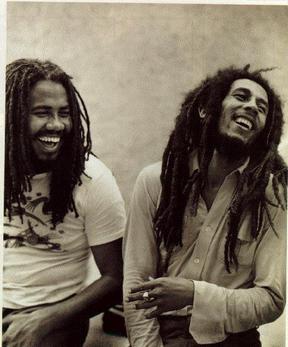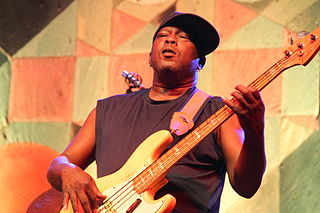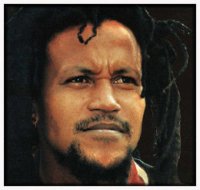Related Research Articles

Reggae is a music genre that originated in Jamaica in the late 1960s. The term also denotes the modern popular music of Jamaica and its diaspora. A 1968 single by Toots and the Maytals, "Do the Reggay", was the first popular song to use the word reggae, effectively naming the genre and introducing it to a global audience. Reggae is rooted out from traditional Jamaican Kumina, Pukkumina, Revival Zion, Nyabinghi, and burru drumming. Jamaican reggae music evolved out of the earlier genres mento, ska and rocksteady. Reggae usually relates news, social gossip, and political commentary. It is instantly recognizable from the counterpoint between the bass and drum downbeat and the offbeat rhythm section. The immediate origins of reggae were in ska and rocksteady; from the latter, reggae took over the use of the bass as a percussion instrument.
The music of Jamaica includes Jamaican folk music and many popular genres, such as mento, ska, rocksteady, reggae, dub music, dancehall, reggae fusion and related styles.
Rocksteady is a music genre that originated in Jamaica around 1966. A successor of ska and a precursor to reggae, rocksteady was the dominant style of music in Jamaica for nearly two years, performed by many of the artists who helped establish reggae, including harmony groups such as the Techniques, the Paragons, the Heptones and the Gaylads; soulful singers such as Alton Ellis, Delroy Wilson, Bob Andy, Ken Boothe and Phyllis Dillon; musicians such as Jackie Mittoo, Lynn Taitt and Tommy McCook. The term rocksteady comes from a popular (slower) dance style mentioned in the Alton Ellis song "Rocksteady", that matched the new sound. Some rocksteady songs became hits outside Jamaica, as with ska, helping to secure the international base reggae music has today.
The Comoros is a group of islands in the Indian Ocean, mostly an independent nation but also including the French territory of Mayotte. It is historically linked to both East Africa and France, and now has a strong Malagasy influence. Zanzibar's taarab music, however, remains the most influential genre on the islands, and a Comorian version called twarab is popular. Leading twarab bands include Sambeco and Belle Lumière, as well as singers including Chamsia Sagaf and Mohammed Hassan.

Mauritius has 2 genres of music that originate from the Island. The traditional music of Mauritius which is known as sega music and also Seggae Music. Other genres like reggae, ragga, zouk, soukous and Indian music are also popular, but these genres do not originate from Mauritius, despite famous local singers such as Kaya, who successfully combined Reggae Music with sega music to create Mauritian Seggae. Well-known traditional sega singers from Mauritius include Ti Frére, Marlene Ravaton, Serge Lebrasse, Michel Legris and Fanfan.
Seychelles, which is an independent island chain in the Indian Ocean, has a distinct kind of music. Folk music incorporates multiple influences in a syncretic fashion, including English contredanse, polka and mazurka, French folk and pop, sega from Mauritius and Réunion, taarab, zouk, soukous moutya and other pan-African genres, as well as Polynesian and Indian music. A complex form of percussion music called Kanmtole is popular, along with combinations of Sega and Reggae called Seggae and combinations of Moutya and Reggae called Mouggae, as is Montea, a fusion of native folk rhythms with Kenyan benga developed by Patrick Victor. Jean Marc Volcy is another famous Seychellois musician who has brought a modern touch to traditional music. He has several albums including Sove Lavi.

Kaya is the tenth studio album by the Jamaican band Bob Marley and the Wailers, released in 1978. The album consists of tracks recorded alongside those released on the Exodus album. It was produced by the band.

Bob Marley and the Wailers were a Jamaican ska, rocksteady and reggae band. The founding members, in 1963, were Bob Marley, Peter Tosh, and Bunny Wailer.
There are several subgenres of reggae music including various predecessors to the form.

Jacob Miller was a Jamaican reggae artist and Rastafari from Mandeville, Jamaica. His first recording session was with the famous Clement "Sir Coxsone" Dodd in the late 1960s. While pursuing a solo career, he became the lead singer for Inner Circle, a famous roots reggae band. Miller recorded and toured with Inner Circle before he died in a car crash in early 1980 at age 27.
Joseph Benjamin Higgs was a reggae musician from Jamaica. In the late 1950s and 1960s he was part of the duo Higgs and Wilson together with Roy Wilson. He was a popular artist in Jamaica for four decades and is also known for his work tutoring younger musicians including Bob Marley and the Wailers and Jimmy Cliff.

Sega is one of the major music genres of Mauritius and Réunion. It is a complete performance art, involving music, story-telling and traditional dance. Musically, the most modern forms common in Mauritius are its fusion genre Seggae and bhojpuri variations, whilst in Réunion we find the addition of maloya, the latter being much closer to the older, typical music influences originating from Madagascar. The variety of different sega forms is reflected in the multi-ethnic populous of the indigenous population of Mauritius.

Robert Warren Dale Shakespeare was a Jamaican bass guitarist and record producer, best known as half of the reggae rhythm section and production duo Sly and Robbie, with drummer Sly Dunbar. Regarded as one of the most influential reggae bassists, Shakespeare was also known for his creative use of electronics and production effects units. He was sometimes nicknamed "Basspeare".
Santé engagé is a genre of Mauritian music which consists of singing and rapping protest songs. It is a way to protest against political/social oppression and repression through music. The genre mixes traditional Mauritian sega with Indian, Chinese and Western influences.
Stéphano Honoré, better known as Menwar, is a Mauritian percussionist and singer. He was one of the pioneers of Seggae music, forming the group Sagaï in the 1980s. Honoré is a player of the ravanne, for which he has begun to develop a written technique, something that has not been done previously. He also plays multiple instruments that he has selfmade or that come from the African culture.
The ska stroke up or ska upstroke, skank or bang, is a guitar strumming technique that is used mostly in the performance of ska, rocksteady, and reggae music. It is derived from a form of rhythm and blues arrangement called the shuffle, a popular style in Jamaican blues parties of the 1940s, 1950s and 1960s.

Joseph Réginald Topize, professionally known by his stage name Kaya, was a Mauritian musician and the creator of "seggae", a fusion of Mauritian sega and reggae, two popular music genres in Mauritius. Kaya died while in police custody ; he was arrested for smoking marijuana during one of his concerts.

Natty Nation is an American rock and reggae band from Madison, Wisconsin. Founded in 1995, as of April 20, 2017, the lineup included Demetrius "Jah Boogie" Wainwright, Aaron Konkol AKA Eyes of Moses, Anthony Paul Willis (drums), & Nick Czarnecki (guitar). The group has released several studio albums since their 1996 debut The Journey Has Just Begun..., in 2010 Isthmus (newspaper) named their 1998 release Earth Citizen one of the "top 25 Madison pop albums of all time," writing that "Natty Nation's mix of roots reggae and hard rock proved unique and gained a following that remains today," and their 2016 release, Divine Spark debuted at #3 on the Billboard (magazine) Reggae Chart.
The following outline is provided as an overview of and topical guide to Bob Marley:
The 1999 Mauritian riots were national-scale rioting and protests in Mauritius following the death of the popular "seggae" musician Joseph Réginald Topize, better known by his stage name "Kaya", in police custody. The rioting lasted for four days from 21 to 25 February 1999. Four civilians and one police officer were killed in the riots with hundreds of people suffering injuries. It was the first incidence of mass rioting in Mauritius since the country's 1968 riots. The riots resulted in a majority of the island's police stations being sacked by protesters with 250 prisoners escaping prison. Many businesses were looted and substantial property damage was done with over 200 vehicles being set on fire.
References
- 1 2 Tom Masters; Jan Dodd; Jean-Bernard Carillet (2007). Mauritius, Réunion & Seychelles . Lonely Planet. p. 45. ISBN 9781741047271 . Retrieved 2009-07-31.
origin sega music.